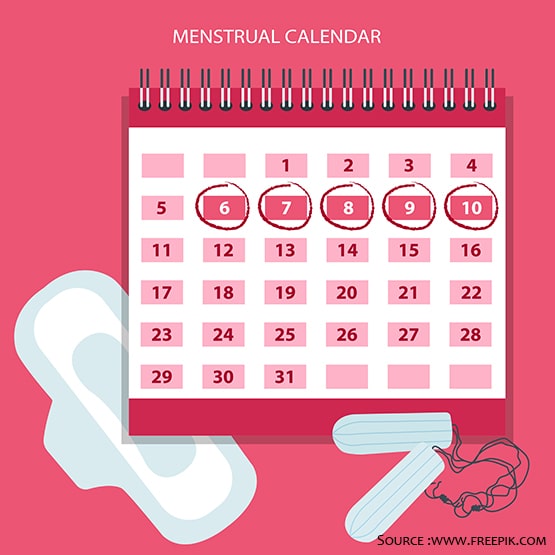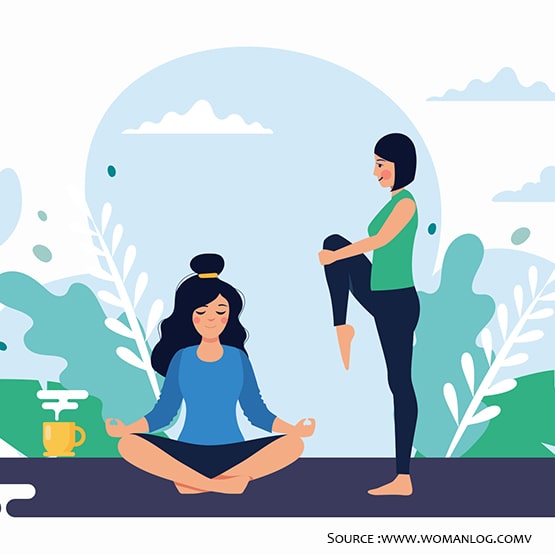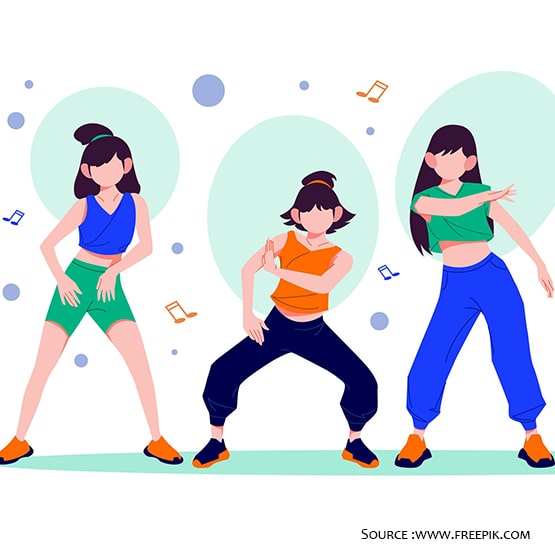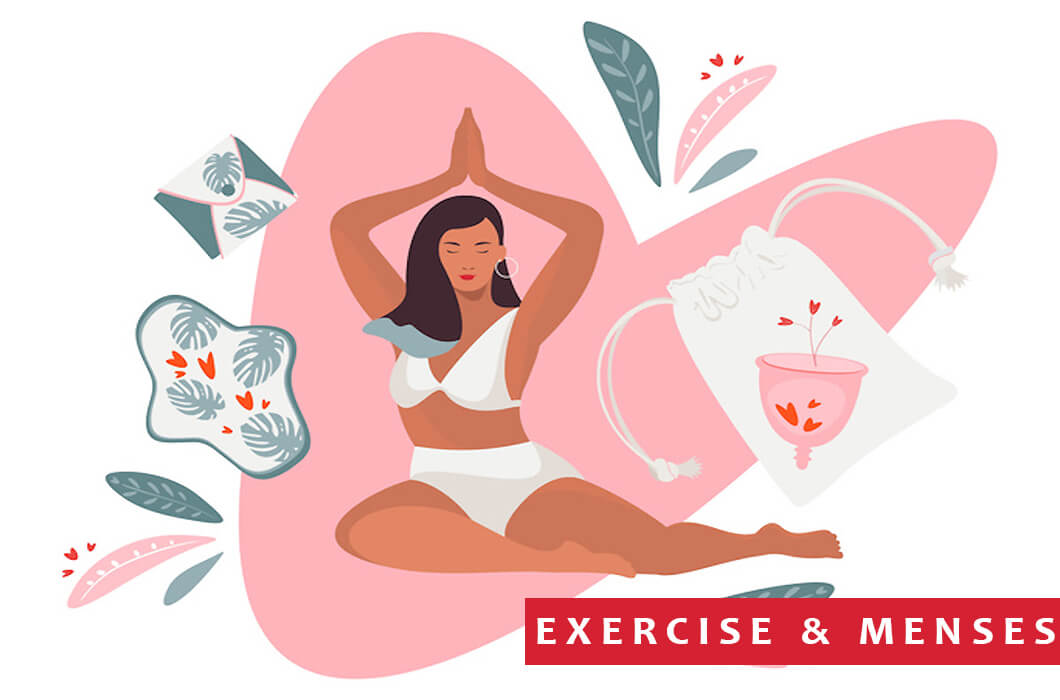- Abdominal cramps
- Stomach upset – diarrhea, nausea, and vomiting
- Headache
- Bloating
- Mood swings
- Irritability
- Fatigue
But the question is,
Are you concerned about how your periods will affect your fitness routine? Should you exercise during periods? Does the thought of working out while on your period make you want to throw away your running shoes for good? You are not alone to stress over it!
For many reasons, a lot of women skip their workouts during this time of the month. But there’s no reason to skip out on exercise just because you have your period. You may feel like you have less energy than normal during the first couple of menstrual days when bleeding and cramps are usually heavier. High-intensity exercises like running may not be appropriate. Instead, yoga, breathing, and light exercises can be a good way to help reduce the pain caused by cramps. Although people may need to adjust their usual exercise routine while on their period, staying active can be helpful. There are many benefits to exercising during a person’s menstrual period. Using some simple tips can make physical activity enjoyable and comfortable.
Benefits of Exercise during periods
Period is a tough time from a hormonal standpoint. Both progesterone and estrogen (female hormones) are at their lowest during the entire length of the period phase of the menstrual cycle. It can make you feel tired and less energetic. But the physical and mental benefits of exercise do not stop just because you have your period. Avoiding exercise isn’t going to save energy or make you feel better. Instead of halting all activity during your period, sticking with a routine can help ease some of the common complaints that you have with menstruation. Use that week as an opportunity to try some new workouts.Here are some benefits of exercising during periods:
Helps With PMS and Improves Mood
Premenstrual Symptoms (PMS) can be a bothersome affair every month before the period. It can affect your normal life and daily routine by causing emotional disturbances, mood swings, concentration issues, and sleep troubles. You might also experience bloating, fatigue, and food cravings. Exercise helps with these problems and reduces pain during menstruation. Aerobic exercises like swimming, walking, jogging, cycling, etc., can help you overcome symptoms like depression, fatigue, sadness, irritability, or anger during your period. It also reduces excess water retention which is very common and bothersome.
Helps Relieve Menstrual Pain
If you experience painful periods, also called dysmenorrhea, you know very well how uncomfortable this time of the month can be. Physical activity does not have to be vigorous or for an extended time. Even two 15-minute walks a day can offer benefits. Exercise is also a healthful choice in general. It helps a person maintain their weight and helps to keep their heart and lungs healthy.Unloose the flow of Endorphins
Exercise gives you a natural endorphin high. It can boost energy levels instead of lowering them during a period. It can elevate your mood and make you feel better. Endorphins are a natural painkiller, when they release during exercise, you may feel relief from uncomfortable periods and pain. All exercise that gets your heart beating faster, even a quick walk or hike, can release the positive benefits of endorphins.
Improved Strength
Understanding your menstrual cycle means knowing when it’s good to push yourself and when you should take a step back. The first two weeks of your menstrual cycle, day one being the first day of your period, may allow you to experience greater gains in strength and power due to low levels of female hormones. Being mindful of your menstrual cycle when strength training can transform results. The change in estrogen, testosterone and progesterone flow during menstruation can improve strength, hand-eye coordination, endurance, and muscle growth.Regularises your Menstrual Cycle
Do you have an irregular menstrual cycle and are often unaware of your dates? Workouts during periods might help. Tracking your menstrual cycle can help you understand how your body is affected by these hormonal changes, and then plan your exercise routine so you can still achieve your health and fitness goals. Exercising while having periods helps regularise period cycles and get your period calendar on track. Aerobic exercises are best recommended to achieve this. Moderate intensity exercises, three days a week, may help women with PCOS to weight, thereby improving ovulation and insulin levels.
The Best Exercises to do during Period
Light Walking and Slow Running
A low-key exercise like walking may be the best during the worst of your period symptoms. You can also go for slow runs on the latter days of your period. Lungs work better later in your cycle. So consider keeping that type of training for the end of your period. These light movements of your body will increase the secretion of endorphins. It will help you uplift your mood, feel better by lowering your pain, frustration and you will be able to burn some calories. So, lace up your favorite sneakers and hit the road for a stroll or a brisk walk around.Low-volume Strength Training and Power-based Activities
Strength training exercises towards the beginning of your period can be good. If you are unable to go for a walk or gym, then at least you can do light weight lifting at your home. Try light lifting and power-based moves that will result in increasing muscle flexibility and strength. Press-ups, squats, lunges, etc., include strengthening your core muscles and are thus highly beneficial. This is a great time to do longer flow sessions that involve a mix of strictly strength work and cardio.Yoga
Commonly associated with wellness and mindful living, yoga is highly recommended for people who do not like the gym and would prefer physical activity without machines. It is scientifically proven and tested that yoga helps to relax your body and relieve your period symptoms such as cramps and bloating. Yoga can relax your cranky and irritable mood just by stretching and breathing exercises. Many yoga poses help to increase your blood circulation, reduce tension, and provide ease to uncomfortable menstrual pain. People who take regular yoga classes experience fewer premenstrual (PMS) symptoms. It also helps in reducing breast tenderness, muscular fatigue, soreness, and abdominal swelling.
Pilates
Pilates is a form of exercise which concentrates on strengthening the body with an emphasis on core strength that can reduce the severity of your cramps. It is the most trending type of workout nowadays. It helps to relax your body and keep you calm and healthy. Pilate moves target specific muscles, so you can tailor your workout as you need.Swimming
Want to go on a swim during periods? Are you worried about hygiene, staining issues, cramps, what would other people think or feel, would I be leaking??! It is a foreign concept for many girls, but swimming is one of the most relaxing and gentle exercises you can do even when you are on your period. The water pressure may slow the flow, but your period will continue. A pad is not a great idea as it could get soggy and fall apart. Therefore, for better protection, you can use tampons or menstrual cups when you’re going swimming.Dancing
Dancing is a fun activity that can uplift your mood and burn extra calories. So ladies! Put on your dancing pants and enroll yourself in a Zumba class if you are up for it.
Stretching
Simple stretches at home can be more beneficial than just rolling on your bed. If you are having discomfort doing other exercises, then try to do stretching and take deep breaths to relax your body muscles.Keep Yourself Well Hydrated
Dehydration can increase side effects such as bloating and constipation. Drinking water reduces menstrual pain, which can make exercise more enjoyable.Types of exercise to avoid
Exercises during your periods shouldn’t put additional stress on your body as this can interfere with your periods. So, there are certain things that you should avoid during your periods. You will be able to continue with your normal exercise routine with just some minor adjustments. It is ideal to eliminate skill and precision training during these few days. If you’re feeling unusually tired, you may want to cut back on intense cardiovascular or endurance-type training. Avoid exercises for a prolonged time. Inversion poses with yoga are not recommended. Overall, people should listen to their bodies during menstruation.Conclusion
It is beneficial to exercise during periods. The female hormones, estrogen, and progesterone are at their lowest during periods. Therefore, core strength workouts are more effective. Exercising from the first day of your period up to two weeks later is the best time to gain strength. People do not need to restrict any particular physical activities while on their periods unless they experience pain or discomfort, which suggests they should slow down.You should work out during periods, indoor or outdoor! Vary your workouts, take extra time to recover, and honor what you’re capable of.
